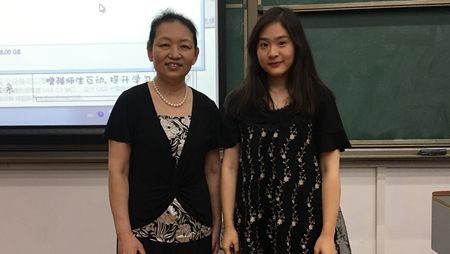Zhao Yonghong: heal the world together and make it a better place
Jun 25, 2018
Peking University, June 18, 2018: Many people know Zhao Yonghong as a vibrant and independent woman, an esteemed professor from the School of Earth and Space Sciences, and an expert who has been dedicated to rock mechanics and geophysics for over 30 years. However, what she cares is more than what she is known for. Last semester, Zhao set up a course for general education called Earth Environment and Human Society at Peking University, and her whole research team has been cooperating with Beijing Environmental Sanitation Engineering Group Company to beautify the living environment in some local communities. She is an eco-activist and it is never about to just strike a pose.
 Zhao (left) with her student
Zhao (left) with her student
The beginning of everything
“Why not?” Zhao smiled when questioned about the purpose to set up the course and spend time and energy in the subject irrelevant to her major. “Some people take it for granted that solving environmental problems is those specialists’ job. Actually, our mother nature is such a complicated unity where different parts interrelate that it calls for power from all walks of society, and wisdom from people of different majors. We all can do something, and what we do will make a difference, big or small.”
Zhao recalled that last summer she bumped into a friend who used to be a professor at Beijing University of Chemical Technology and now is one of the managers in Beijing Environmental Sanitation Engineering Group Company. She was shocked to know that one of the key environmental problems is kitchen waste. “Kitchen waste is perhaps the most common garbage. Every time we eat an apple, cook dinner or clean up leftovers, kitchen waste is produced. It is so common that we just throw it away with other garbage without hesitation. In fact, if not separated, the kitchen waste of high water content will pollute other garbage, making it harder to pick out recyclable materials and burn them up. Moreover, kitchen waste is a seedbed for bacteria to reproduce, not only destroying the environment but also threatening people’s health.” To prevent is better than to solve. The idea of setting up a course about saving environment then struck her.
Explore the new path
“Why not now?” Zhao sighed and said that with the growth of technology and economy, environmental problems have become more serious than before. “A talk show host once said that protecting environment is not for earth but for ourselves not to become another extinct species. This is not a joke. Oils are burning out, temperature is increasing and wastes are besieging our living spaces. However, most of the environmental problems are not technical problems. It is always about our concept and attitude. If we all stop buying ivory, more elephants will be saved.”
Zhao said that now is the perfect time to take action. “New policies and laws on environmental issues are made. More and more organizations are formed to make contributions. What we should do is to draw people’s attention and show them the right way. That’s where education will do its magic.” Zhao believed that courses for general education should not only be oriented in professional knowledge, but also cultivate students’ interest for problems nowadays and inspire creative ideas. Therefore, she encouraged students to discuss and express ideas from their own perspectives in class and organized many activities off class. When students handed in their final works, Zhao was happy to see that her students pay much more attention to the environment around them and get the ability to tackle the problems.
Small move, big difference
In the following semester, besides her course at Peking University, Zhao will also teach lessons to kids in primary school and help their community to do garbage classification together with Beijing Environmental Sanitation Engineering Group Company. “We have seen many similar activities that didn’t work out. It is not enough to do some publicity and count on people’s own consciousness. We will focus on dealing with kitchen waste in one community. We show them the whole process, supervise for long enough until they nurture a good habit, and then move to the next community.”
Like the saying goes that no act of kindness, however small, is ever wasted. Zhao is looking forward to more people joining the team. “It’s better late than never.”
Reported by: Tian Gang
Edited by: Yan Shengnan
